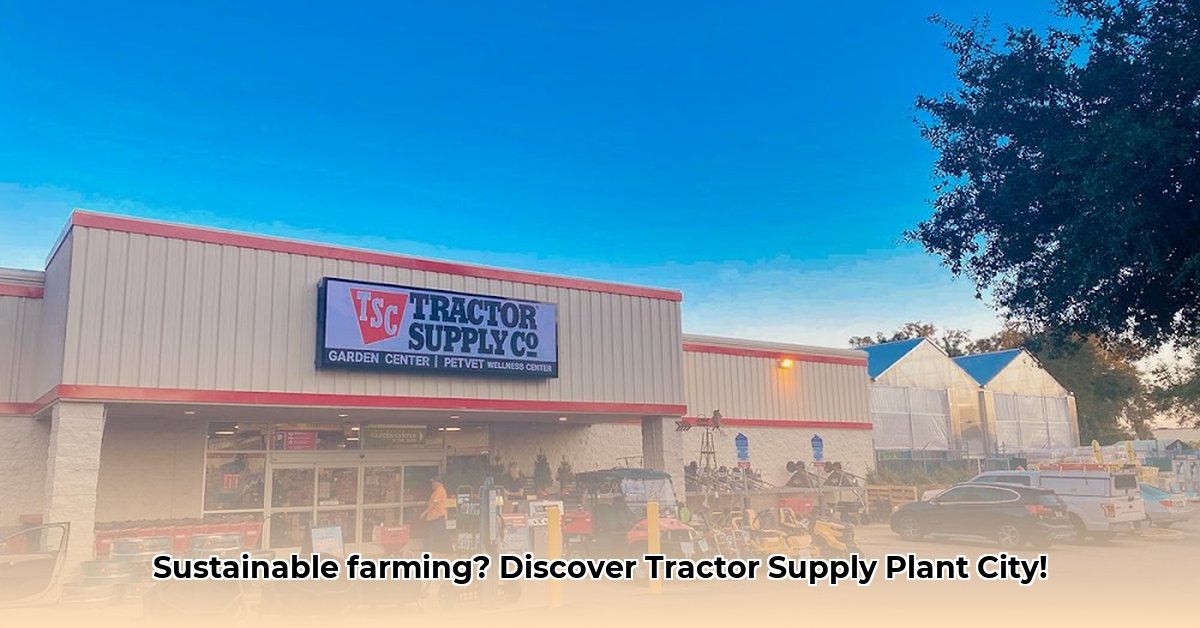
Tractor Supply's Role in Plant City's Sustainable Agriculture
Tractor Supply Company (TSC) in Plant City, Florida, serves as a vital resource for local farmers, providing essential supplies and contributing to the overall sustainability of agricultural practices. Its convenient location within Plant City saves farmers valuable time and money on transportation, a significant advantage for smaller farms operating on tighter margins. This accessibility directly impacts their economic viability and supports sustainable farming practices by reducing operational costs. Beyond core supplies, TSC's extensive pet supplies are crucial for maintaining the health and productivity of working animals on local farms, directly contributing to the overall farm's sustainability. For more on TSC's pet supplies, check out this resource. Is this readily available access a significant factor in maintaining the economic stability of Plant City's farms? The data suggests a strong correlation between convenient access to supplies and the financial health of sustainable farming operations.
Limitations and Challenges Facing TSC in Plant City
While TSC contributes positively, opportunities for improvement exist. A significant challenge lies in the lack of readily available information regarding the sustainability of their supply chains. Transparency regarding product sourcing, carbon footprint related to shipping, and efforts toward sourcing sustainable or organic materials is crucial. This lack of readily accessible information hinders TSC's ability to fully support sustainable practices and hinders consumer confidence. Additionally, TSC's current engagement with regenerative agriculture practices remains unclear. The absence of detailed information about support for regenerative farming techniques represents a missed opportunity to promote truly sustainable agricultural models. Does TSC's limited engagement in regenerative agriculture limit its overall contribution to sustainable farming? It's a critical question requiring further investigation.
Actionable Steps for a More Sustainable Future
To enhance its contribution to sustainable agriculture, TSC and its stakeholders should take the following steps:
1. For Tractor Supply Company Management:
- Short-Term (0-1 year): Conduct a thorough Life Cycle Assessment (LCA) of its products to achieve greater transparency in its supply chain, and publicly release a comprehensive sustainability report detailing all environmental impact data. This will improve trust with consumers. (LCA: a process assessing environmental impacts of a product's entire life cycle.)
- Long-Term (3-5 years): Develop a comprehensive sustainability initiative with measurable targets for reducing carbon emissions and sourcing sustainable materials. This proactive approach will demonstrate commitment and allow for tracking progress.
2. For Farmers and Consumers:
- Short-Term (0-1 year): Actively demand sustainable products from TSC and support businesses prioritizing sustainable practices. Increased consumer demand drives change.
- Long-Term (3-5 years): Adopt regenerative farming practices where feasible, increasing demand and consequently incentivizing TSC to support this approach. Educate themselves on sustainable practices to make well-informed purchasing decisions.
3. For Governmental Agencies and Supply Chain Partners:
- Short-Term (0-1 year): Collaborate with TSC to facilitate the implementation of sustainability initiatives through grants, subsidies, and policy incentives. Such collaborations foster impactful change.
- Long-Term (3-5 years): Promote sustainable supply chain practices through certifications and standards, ensuring environmental compliance across the entire chain. Governmental encouragement incentivizes positive change within the supply chain.
Conclusion: A Shared Path Towards Sustainability
Tractor Supply Company holds immense potential to significantly contribute to sustainable agriculture in Plant City. However, realizing this potential requires collective effort, transparent communication, and proactive action from all stakeholders. By embracing greater transparency, investing in sustainable practices, and fostering strong collaborations, TSC can become a leader in promoting sustainable agricultural practices, benefiting both the environment and the local farming community. The goal is a shared future built on environmental stewardship and the long-term economic health of Plant City’s agricultural sector. The steps laid out above represent a pathway menuju toward a more sustainable future; will TSC and its partners embrace the challenge?